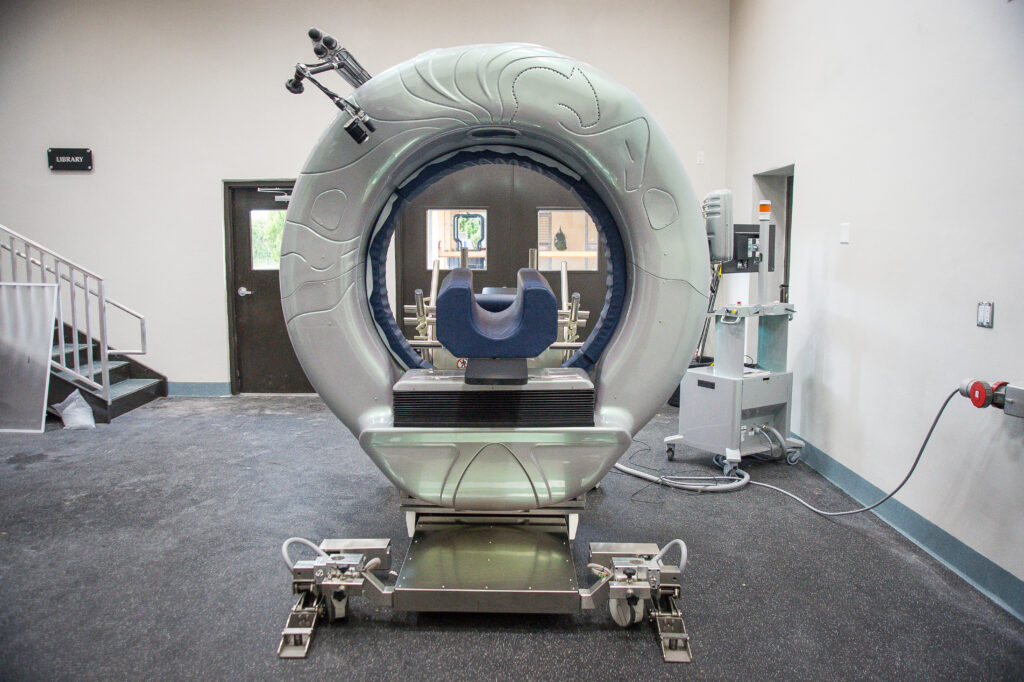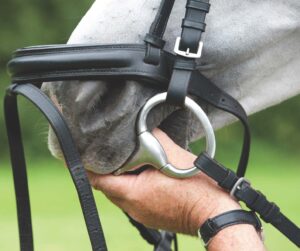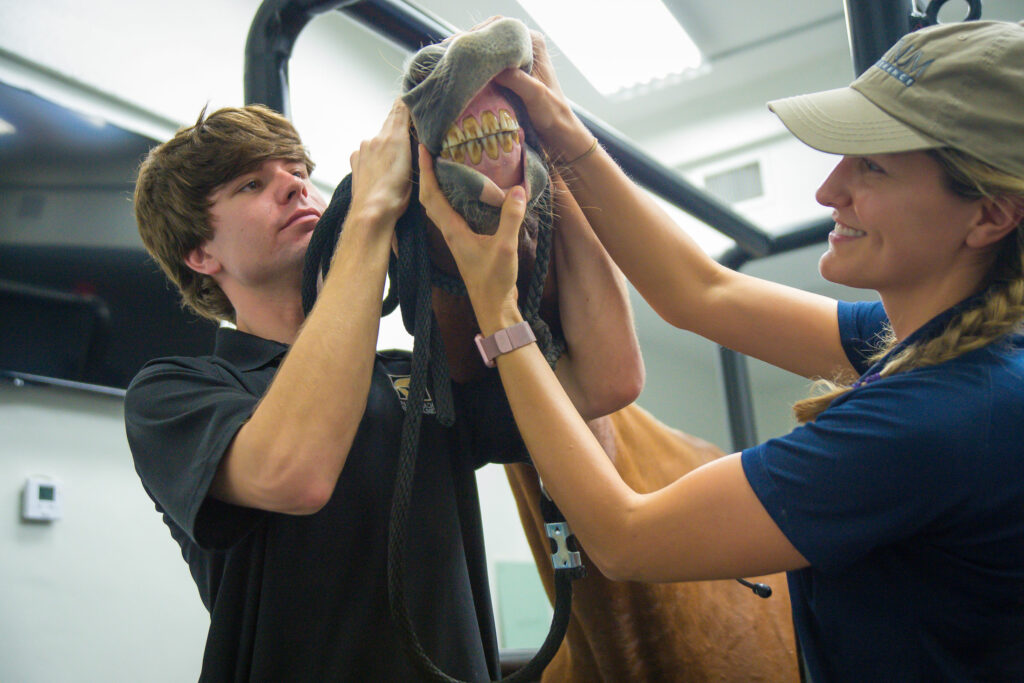Tag: tyler davis
A Healthy Mouth is a Supple Mouth
Healthcare Reminder: Equine Dentistry
The general goals of equine dentistry may appear straight-forward but include a complex system of evaluations that in turn affect the entire body and well-being of a horse. At its core, equine dentistry encompasses the objectives of maintaining even tooth wear, treating infection or disease, allowing for proper digestion, and promoting longevity. Dr. Tyler Davis of Palm Beach Equine Clinic says that routine and thorough dental exams can help prevent many issues from ever becoming problems.
Why do horses require dental care?
Horses grind their food into a finely masticated bolus before swallowing. The combination of a horse’s upper jaw being larger than the lower jaw, and the fact that a horse chews by moving their jaws from side to side results in uneven wear of the teeth. This uneven wear may cause sharp edges to form, which hinder efficient chewing and may ulcerate or tear the cheeks and tongue. Uneven wear can also cause the horse to swallow food that isn’t properly chewed and can lead to more daunting problems such as colic.
No horse is exempt from needing their teeth cared for by a veterinarian. For sport horses, however, dental care becomes even more crucial. Much of the connection between horse and rider comes by way of the horse’s mouth, and depending on the discipline, the horse may always have pressure in their mouth. If there are problems or discomfort within the mouth, it can become evident in the horse’s performance and disposition under saddle.
According to Dr. Davis, having a horse’s teeth in perfect shape allows one to immediately rule out dental issues when trying to troubleshoot a performance problem. A “sound mouth” also allows the best condition for supple, soft, and accurate connections between horse and rider through the bridle.
What is floating?
On a basic level, most horses require a routine float. Floating is the term for rasping or filing a horse’s teeth to ensure an even, properly aligned bite plane. While floating is the physical process, the scope of equine dentistry is much broader and examines the horse’s overall health as influenced by the mouth.
“A proper dental exam using a lightweight speculum, a very good light source, and a dental mirror allows me to see any possible problems and prevent those problems from becoming painful and affecting a horse’s performance and overall health,” said Dr. Davis.
How often should you have a veterinarian perform a routine dental exam on your horse?
Dr. Davis recommends an exam every 12 months at a minimum. For many sport horses, the demands of their competition schedule may require bi-yearly exams to prevent any problems that could sideline them from training or events. Lastly, any horse with a history of dental problems may require exams every three to four months. Without routine dental exams by a veterinarian, uneven wear can escalate to a serious health problem.
The most common signs of dental discomfort in horses include:
- head-tilting and tossing
- difficulty chewing
- bit-chewing and tongue lolling
- tail-wringing, bucking and other behavioral issues
- drooling and bad breath
- (sometimes) weight loss and spillage of grain
Technological Advances
While it is the owner’s responsibility to develop a diligent care routine, the veterinary community has done its part by continuously improving evaluation and diagnostic technology. Advances in instruments, such as the speculum and imaging technologies, allow veterinarians to better understand and examine the equine mouth. In turn, they are able to diagnose and treat dental problems more effectively.
Equine dental health is far more involved than simply evaluation the outward appearance of the teeth. While trained eyes can see external problems, and educated hands can feel for abnormalities, assessing internal issues can be done through diagnostic imaging. Improved imaging technology has greatly expanded Dr. Davis’ ability to find and analyze unseen problems in the mouth.

Portable imaging technology, such as digital radiography (x-rays) allows him to conveniently understand dental pathology better for his patients in the field. While Standing Computed Tomography (CT) allows Dr. Davis to capture a comprehensive, multiplanar profile of all the structures within the horse’s head, with the horse only lightly sedated.
“Having these advanced imaging modalities available for my patients allows us to thoroughly identify an issue and then intervene as early as possible to treat the issue, relieve discomfort, or prevent tooth loss,” commented Dr. Davis.
Contact your veterinarian at Palm Beach Equine Clinic for more information on equine dentistry, or to schedule a dental exam, at 561-793-1599.
Get in Touch with Palm Beach Equine Clinic
Contact us by filling out this form.
Dr. Tyler Davis graduated from the University of Glasgow School of Veterinary Medicine in Glasgow, Scotland, and performed his undergraduate studies at Pennsylvania State University. He then became a member of the Royal College of Veterinary Surgeons. Dr. Davis was born in Linesville, Pennsylvania, and is married to Dr. Janet Greenfield, also a Palm Beach Equine Clinic veterinarian. He enjoys fly-fishing and spending time with his wife and their two children.
How did you get your start with horses?
Entering vet school, my intentions were always to work in large animal medicine. I actually thought I might focus on farm animals, having grown up in a farming area in Pennsylvania. My focus turned to horses alone after starting to work with the university research ponies and spending more time around the equine hospital in my first year of vet school.
When and why did you decide to become a veterinarian?
My interest in veterinary medicine started in middle school. I participated in 4-H, raising animals for our county fair, and had friends who were farmers. Between the two I met many of the local vets and experienced the veterinary profession. When offered to ride along with them on calls, I agreed. While I did investigate other degrees within the science/biology field, I settled on veterinary medicine.
What was the experience of attending veterinary school in another country, and how did that enhance your education?
I was lucky to have the opportunity to attend vet school at the University of Glasgow in Scotland. Attending vet school in a different country afforded me the opportunity to visit places and experience cultures I would have otherwise never had. Also, I believe the experience allowed me to see agricultural practices in a different light, when compared to those practices in the USA. I participated in externships both in the UK and in the USA (knowing I wanted to move back home following graduation) while attending vet school, allowing me to discover different qualities from each.
Why did you choose to focus on dentistry?

I think that I have a strong focus in dentistry but have a number of other skills as well. When starting at PBEC there were only 1-2 other doctors in the practice performing routine dentals floats and the like. I enjoyed the dental work and began steering my focus on the topic through wet labs, continuing education seminars, etc.
What kinds of work are involved with equine dentistry?
My focus in dentistry goes beyond simply floating teeth. While routine dental floats do take up a large portion of my dentistry duties, there are other aspects of the field, which I participate in as well. I also see horses for dental examinations when we may think there is a relationship between the dentition/head and their ability to perform at their desired level. Tooth extractions make up another portion of the dentistry I perform. Occasionally we find infected or fractured teeth on the routine dental exams, but more often these horses are referred to us, either with a diagnosed tooth problem or with a related complaint (not eating, plays with bit during work, throwing head, etc.). We are able to bring these horses to the clinic to be “worked up” (diagnosis through x-ray, oral exam, etc.) and treated (oral tooth extraction, sinus flush, etc.). We have a great facility offering versatility with cases. I work closely with our surgical staff so that if needed, we can put a horse under general anesthesia if more invasive surgical procedures are merited.
What do you love about working at PBEC?
Palm Beach Equine Clinic has both a great facility and great staff. It is a joy working here.
What are some of your other interests?
My other interests include archery, fishing, and woodworking. Typically if I am not working then I am spending time with my beautiful wife and daughters.
What is something interesting that people may not know about you?
Growing up in Pennsylvania, I am actually a pretty good Polka dancer.


